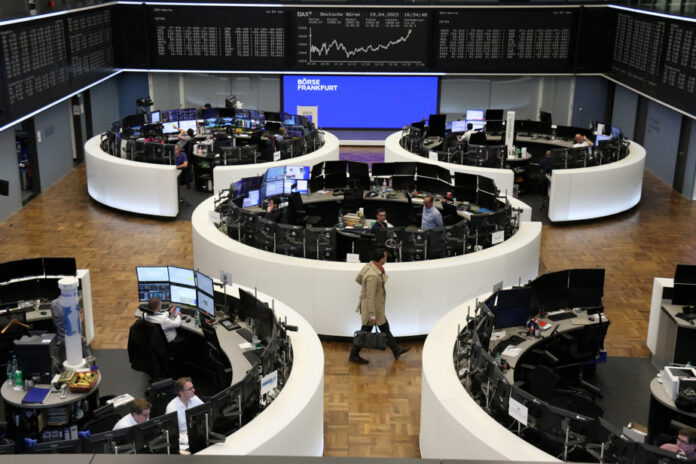(Paris) Uncertainty about the monetary policies of central banks, in the United States and in Europe, continued to plague global markets on Thursday, which were also being dragged down by the decline in the automotive sector.
In the United States, Wall Street opened lower, the Dow Jones fell 0.46%, the NASDAQ 0.34% and the S
In Europe, after a hesitant opening, the indices were in the red around 10:10 a.m. (Eastern time): -0.26% in Paris, -0.74% in Frankfurt, -0.11% in London and -1.12% in Milan.
“We are now at a key moment in the tightening cycle (central bank monetary policy, editor’s note), made all the more difficult by last month’s mini-banking crisis and the repercussions it will have on credit and the economy over the rest of the year,” notes Oanda analyst Craig Erlam.
According to the “Beige Book”, which brings together all the surveys carried out by the twelve regional branches of the American Federal Reserve, the volumes of loans granted by banks in the United States “diminished” in March and at the beginning of April, that is to say since the banking crisis caused by the bankruptcy of the SVB bank.
In the results of its last monetary meeting in March, the Fed also estimated that the recent banking difficulties “could lead to a slight recession” this year in the United States. And “either the recession is deep and in this case, save who can, or it is light and there, it’s not the end of the world”, estimates Stephen Ausseur of Natixis Wealth Management.
But for the time being, in the euro zone as in the United States, inflation remains at a level still considered too high. In addition, on Wednesday the market was surprised by the level of inflation in the United Kingdom which remained above 10% in March, which encourages the Bank of England to continue on the path of monetary tightening.
In the bond market, the yield on ten-year U.S. Treasuries fell (3.53% by 10:00 a.m. EST, from 3.59% at the close the day before) after the increase in weekly listings at the unemployment, at its highest since August, signaling a slowdown in the economy.
On Wall Street, Tesla unscrewed at the open and was down 7.08% around 10:5 a.m. EST. Investors have taken a dim view of Tesla’s repeated price cuts in recent months to boost demand for its electric vehicles. If the decision allows its sales to continue to climb, it also weighs on its profits.
“We want to continue to sell as many cars as possible despite the uncertain macroeconomic environment,” Elon Musk said on Wednesday during a conference call after the publication of quarterly results on Wednesday.
In the wake of the American, the whole sector suffered on Thursday. Around 10:05 a.m. (Eastern time), in Paris the Renault share fell by 7.69%, Michelin by 3.98%, Stellantis fell by 5.77% and Faurecia by 7.09%. In Frankfurt, Porsche lost 4.32%, Volkswagen 3.46%, BMW 4.38%. In Milan, Ferrari dropped 2.12%.
The dollar was stabilizing against the euro on Thursday, with analysts focusing on speeches from Fed officials ahead of a period of silence that will begin Saturday as their meeting approaches. Around 10 a.m. (Eastern time), the euro gained 0.20% to 1.0978 dollars for one euro.
Oil prices continue to fall, amid concerns for growth and demand for crude. By 10 a.m. EST, a barrel of North Sea Brent crude for June delivery was down 2.09% to $81.38.
Its American equivalent, the barrel of West Texas Intermediate (WTI), for delivery in May, of which it is the last trading day, dropped 2.29%, to 77.34 dollars.





